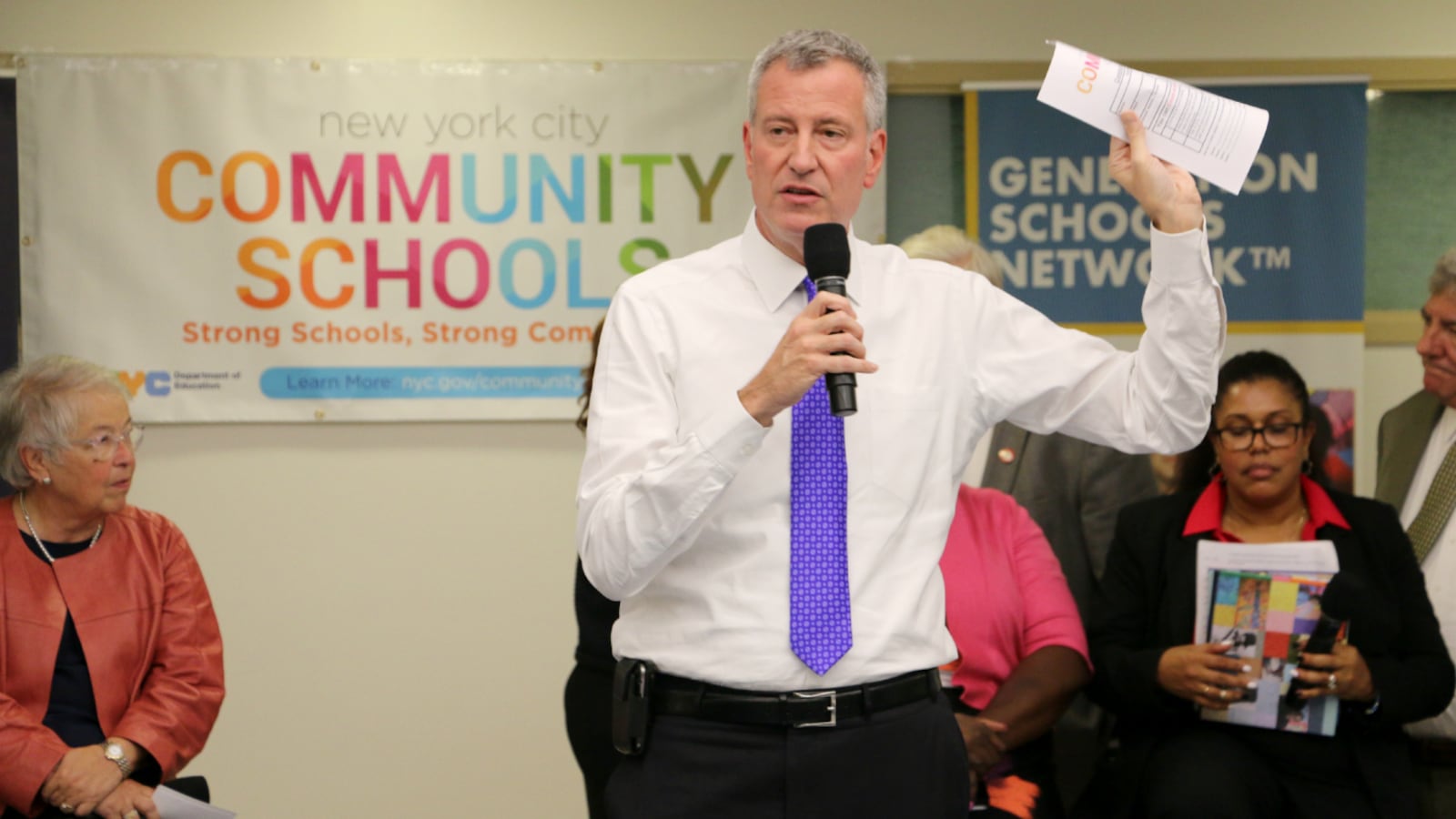Mayor Bill de Blasio offered new clues Wednesday about the future of dozens of struggling schools that remain in the city’s Renewal turnaround program, saying the schools will learn their fate this school year.
Now in the fourth year of what was originally billed as a three-year effort, the Renewal program has been a pillar of the mayor’s education agenda. It aimed to rapidly turn around 94 long-struggling schools by adding extra social services and academic supports and will have cost the city over $750 million by the end of this school year.
Of the 50 schools that remain in the program, “We expect a lot of those schools to graduate out,” de Blasio said at a morning press conference at P.S. 377 in Queens, “but ultimately this is the year to decide what happens with all of them.”
City officials have been reluctant to offer definitive answers about how long the program will continue and what benchmarks schools need to reach to no longer be considered in need of extra support and oversight. De Blasio’s comments on Wednesday offer a new timeline for answering some of those questions and suggests the city may be looking to make significant changes this school year.
“We gave an extra year because we thought it was worth it,” de Blasio said. “We thought the additional investment would make a big difference for a lot of them.”
The city has always acted as if the Renewal program would extend beyond the three-year mark, but just days after starting as the city’s new schools chancellor in April, Richard Carranza expressed concerns about the program, saying it didn’t appear to have a clear “theory of action” (though he has since backed off that stance).
Questions remained on Wednesday as schools opened for the year about how the program is being supervised and what the city’s goals are for each school.
Despite hiring a round of new senior officials, Carranza has not replaced the Renewal program’s superintendent, who stepped down in March. The education department has also not publicly released any of the goals the schools are expected to reach this year, which typically include metrics like test scores, attendance, and graduation rates. (And unlike previous years, neither the mayor nor chancellor visited any Renewal schools on the first day of school.)
“The goal posts have never been very clear — either in terms of specific outcomes that would guide hard decisions or timelines,” said Aaron Pallas a professor at Teachers College who has studied the Renewal program.
A spokesman for the mayor’s office referred questions about de Blasio’s comments to the education department. Will Mantell, a department spokesman, said the city expects to “share an update this fall” about the city’s plans for the program but did not offer details or explain the city’s targets for each school.
“We’re continuing to provide Renewal Schools with unprecedented supports under First Deputy Chancellor [Cheryl] Watson-Harris’s leadership,” Mantell said in a statement.
The program, pitched as an alternative to large rounds of school closures under the Bloomberg administration, has offered additional supports such as extending the school day, providing academic coaching for teachers, adding social services like mental health counseling and dental clinics, and partnering with community organizations.
The initiative has prompted fierce debate about whether this approach is the best way to turn around the city’s lowest-performing schools. While the city argues the program is making a difference and some school leaders have appreciated the extra assistance, researchers have found that the program has not generated significant academic improvements measured by test scores and graduation rates.
Of the 94 original schools, 14 have been closed, nine have left the program after being merged with other schools, and city officials said 21 have shown enough progress to slowly ease out of the program. No schools have been added to the program since it began in 2014.
On Wednesday, Carranza suggested some of the responsibilities for overseeing school turnaround efforts would fall to nine recently-created “executive superintendents” who Carranza said he vetted partly for their “experience in turning around schools and supporting academic growth in schools.” And he said Renewal schools would not lose the extra support they have been given — similar to the help a wider group of “community schools” receive — even as the program may evolve.
“If you invested those kinds of resources in building a community school network and approach around a school, then as a school gets better why in the world would you ever pull that away?” Carranza said.

